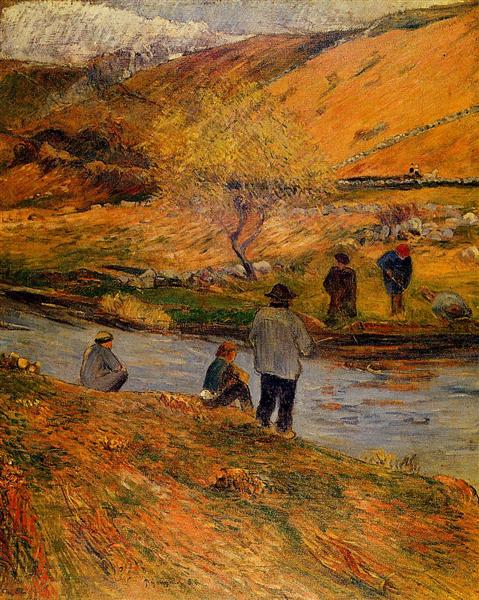Description
Paul Gauguin's painting "Breton Fisherman", created in 1888, is a work that encapsulates the essence of the artist's post-impressionist style, marking a crucial moment in his pictorial evolution and his exploration of Breton culture. In this work, Gauguin presents a vision charged with symbolism and color, distinctive characteristics of his artistic process, which had been formed from his experiences in France and his longing for simplicity and authenticity.
The painting depicts a fisherman who stands out in the foreground, wearing traditional attire that reflects a deep connection with the land and the sea. The figure itself is imposing, thanks to its strong presence and the artist's choice of a firm, upright position. The fisherman, with his dark coat and straw cap, becomes a symbol of rural life and hard work, in contrast to the modernity that was beginning to take hold in European cities. The man's posture, as well as his gaze, suggest an introspective, almost meditative serenity that invites the viewer to reflect on man's relationship with nature and his environment.
The composition of the work is characterised by a balanced structure that guides the viewer's gaze towards the background of the scene; the horizon is presented under a sky that, although apparently calm, suggests imminent changes. The blue and green tones of the sea contrast with the warmer colours of the main character and the background, which includes vegetation and a soft outline of the Breton landscape. The intentional use of colour, which goes beyond naturalistic representation, is one of Gauguin's most significant decisions, as he prefers to use a palette that evokes sensations and emotional states rather than a mere reflection of reality.
Gauguin, through this work, advocates a painting that transcends mere visualization; his expressionist approach is also present in the application of paint, which is often bold and rich in nuance. The technique of loose brushstrokes and the use of planes of color rather than fine detail strengthen the atmosphere of the work, contributing to the overall feeling of immediacy and vitality.
The Breton Fisherman is also a clear example of Gauguin's interest in Brittany life and the cultures that surround it, a theme that was embedded in his artistic work during his stay in this region. During the 1980s, the artist was attracted by this culture that he considered more authentic compared to the urban and commercial life of Paris. His fascination with spirituality and local traditions becomes a pillar in many of his works from this period, creating a connection between art and cultural identity.
Thus, “Breton Fisherman” is not only a depiction of a man in his surroundings, but stands as a broader symbol of Gauguin’s search for connection with the primitive and the genuine, echoing his desire to escape the complexities of modern civilization. The work is a testament to the artist’s commitment to the exploration of color, form, and cultural subject matter, inviting the viewer into a meditation on life, labor, and connection to the land that resonates deeply even today. In every stroke and every nuance of this work, Gauguin leaves a mark that allows us to open a dialogue about life and history within and beyond his canvas.
KUADROS ©, a famous painting on your wall.
Hand-made oil painting reproductions, with the quality of professional artists and the distinctive seal of KUADROS ©.
Painting reproduction service with satisfaction guarantee. If you are not completely satisfied with the replica of your painting, we will refund 100% of your money.

